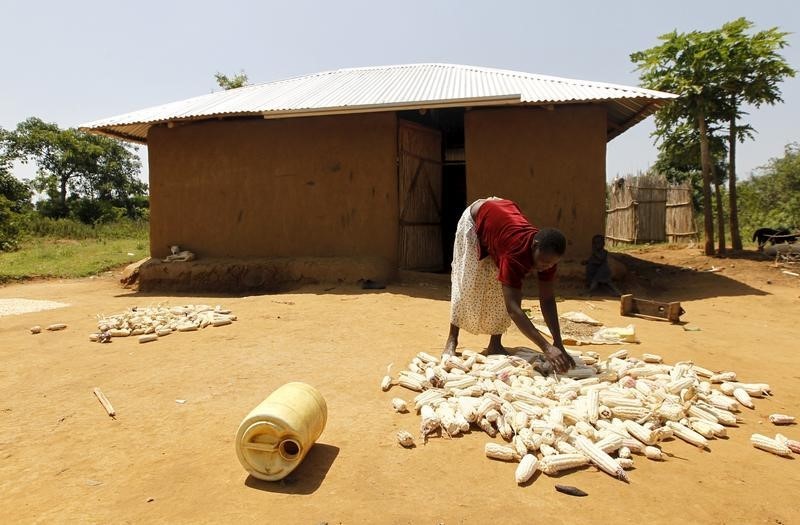Image: Mary Adhiambo, dries her maize in the sun outside her house in the U.S. President Barack Obama’s ancestral village of Nyang’oma Kogelo, west of Kenya’s capital Nairobi, July 15, 2015. REUTERS/Thomas Mukoya
By Anthony Langat
MASII, Kenya (Thomson Reuters Foundation) – In the late afternoon, Angelina Mwangangi, 52, is digging on her farm on a slope overlooking Iveti hill in Machakos County, southeast of Nairobi. To prevent erosion when the rains come, she has carved out terraces.
Since the harvest in August, farmers here in Mathitu village have been preparing their land for planting in time for the short rainy season in mid-October. But unlike in the past, when low rainfall resulted in poor or no harvests, Mwangangi is confident of a bumper crop this season.
Since 2014, she has been planting drought-resistant seeds that can thrive even with the minimal amount of rain this area typically receives.
Mwangangi plants just enough cowpeas and beans for her family’s subsistence needs, as she has only three-quarters of an acre of land (0.3 hectares).
After harvesting her first drought-resistant crops, she prepared a meal traditionally eaten by the Kamba people called muthokoi, a mixture of maize, cowpeas and beans.
“The whole family liked it – they realized it was different from the muthokoi made from Nduma maize which we used to plant before,” said the mother of four.
Since then, she has switched entirely to drought-resistant varieties of maize, cowpea and beans.
Despite poor rainfall, Mwangangi harvested 16 bags of maize last year from half an acre (0.2 hectares), twice as much as before.
Mwangangi sells part of her maize harvest to a local secondary school, which pays a decent price, and uses the proceeds to cover school fees for her children, among other expenses.
“I just sold ten bags to the school at 3,000 shillings ($29.65) a bag and made a good amount of money,” she said.
Mwangangi was introduced to the drought-resistant seeds by Domitila Nduku, a farmers’ network coordinator for Farm Input Promotions Africa, a Kenyan non-profit organization.
Nduku works with village advisors all over Masii sub-county to provide farmers with access to high-quality seeds and fertilizer, and to develop their skills in planting, harvesting and marketing their crops.
In neighboring Kalie village, Nduku works with Mary Kalondu, a village advisor who helps her reach local farmers.
Two hundred farmers in Kalie and the surrounding villages now plant the drought-resistant variety of maize Nduku introduced them to. She organizes regular field days to teach farmers about good practices and the best inputs for better yields.
GOOD FOR BUSINESS
Seed manufacturers and other farm input businesses use Nduku’s networks to sell their products to farmers. Nduku stocks seeds from Dryland Seed Limited (DSL), which is based in Machakos and focuses on “climate-smart” varieties.
Apart from their higher yield, the company’s seeds also cost less than other varieties.
“Many farmers have called me, and others have come here asking when we will have the seeds,” said Kalondu in Kalie village. “They are asking for mainly maize and beans.”
Nduku said she was waiting for a consignment from DSL, which would be delivered to the village advisors who then distribute the seeds to farmers.
The advisors sell seeds from their homes, making it easier for farmers who used to have to travel to towns like Masii or Machakos to buy their farm inputs.
DSL managing director Ngila Kimotho said when the company started around 10 years ago, it focused on drought-resistant varieties of staple crops, including maize, beans and cowpea.
“We then widened the range of products and brought in pigeon pea, green gram, sorghum and then last year we went into vegetables,” he said.
Demand for drought-resistant varieties has increased, due to the erratic timing and low levels of rainfall in the country’s eastern region, made up of arid and semi-arid land.
In 2006, DSL sold just 5 tonnes of seed, but it expects to sell 1,000 tonnes in 2016, Kimotho said.
The company supplies most parts of Kenya’s eastern and western regions, as well as the Rift Valley. Kimotho is confident that, with increased awareness, most farmers will adopt drought-resistant seeds.
In Mathitu village, Mwangangi awaits both the rains and the seeds in order to plant this month. She has leased an additional quarter of an acre, and will have to buy more seeds this time round.
“It is because I had a good yield that I decided to expand the farm,” she said.
(Reporting by Anthony Langat; editing by James Baer and Megan Rowling. Please credit the Thomson Reuters Foundation, the charitable arm of Thomson Reuters, that covers humanitarian news, women’s rights, trafficking, property rights and climate change. Visit http://news.trust.org)
Copyright 2016 Thomson Reuters. Click for Restrictions.


